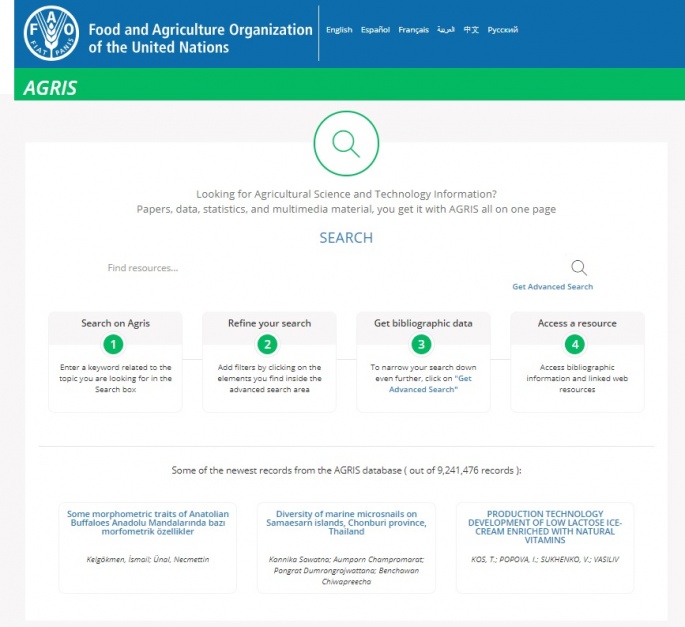The total number of AGRIS records reaches 9,241,476 (June 2018)

.jpg)
As of June 2018, number of AGRIS multilingual bibliographic records/resources has reached 9,241,476.
New 889 records include all data received from AGRIS Data Providers in May 2018.
The next AGRIS data release will take place in July 2018.
The AGRIS team at the FAO of the UN wishes to thank all AGRIS contributors and users!
AGRIS : BACKGROUNDFAO - AGRIS (International Information System for the Agricultural Science and Technology) is a free of charge service that provides access and visibility to research information resources in agricultural and related sectors. Since 1975, AGRIS has been maintained by Food and Agriculture Organization of the United Nations (FAO of the UN), thus helping enhance visibility of agricultural publications produced worldwide by governmental agencies, universities and research centres. # Currently, AGRIS network embraces 350 Data Providers (from up to 145 countries) which submit bibliographic data on research papers, reports, multimedia material, grey literature and other content types. Details about AGRIS data providers are hosted on CIARD RING. # AGRIS is used by students, researchers, lecturers, librarians and other information professionals, publishers and professional associations, government officials, and is accessed by up to 600,000 users each month. # The AGRIS network is comprised of up to 14,000 registered AGRIS members.
# AGRIS records are:
|
Did you know? "Since December 2013, AGRIS adopted a LOD (Linked Open Data) infrastructure, which allowed the creation of mashup pages, where users looking for specific topics (e.g. impacts of climate change in a country) can access a publication from the AGRIS database, combined with other related resources extracted from other preselected datasets. External resources available in AGRIS mashup pages are not only bibliographic metadata, but also distribution maps, statistics, germplasm accessions, and so on. In this paper we explore a new data source available in AGRIS mashup pages: the web itself" (Celli F, Keizer J, Jaques Y et al. Discovering, Indexing and Interlinking Information Resources, F1000Research 2015, 4:432 (doi: 10.12688/f1000research.6848.2)

Related content:
- Recorded webinar: AGRIS for Agricultural Information Data providers
- AGRIS Advanced Search Possibilities (Part I)
AGRIS Advanced Search Possibilities (Part II)
- Common queries about AGRIS
For more detailed information on how to search AGRIS content, please visit the How it works page on the AGRIS website. The search results are displayed on one page with on the left side the AGRIS bibliographic records and on the right the linked resources & an advanced search area.
In case your institution would you like to contribute to AGRIS with bibliographic references pointing to agriculture, forestry, animal husbandry, aquatic sciences & fisheries, human nutrition and related issues, please visit the For contributors page.
You might also find useful to read this guiding blog 'Locating full-text articles in AGRIS' providing details on how to retrieve full-text articles using the AGRIS database.
- AGRIS : meeting the global agricultural information need
- AGRIS – facilitating access to African agriculture, science and technology literature
- AGRIS content coverage: facilitating access to global agricultural literature
- AgroTagger classifier. Leveraging the knowledge encoded in AGROVOC for AGRIS items
- AGROVOC multilingual Thesaurus of the FAO of the UN
- AGRIS discussion group on DGroups

To keep up-to-date with AIMS news, please, Sign up for AIMS news, follow @AIMS_Community on Twitter.
And, thanks again for your interest !

